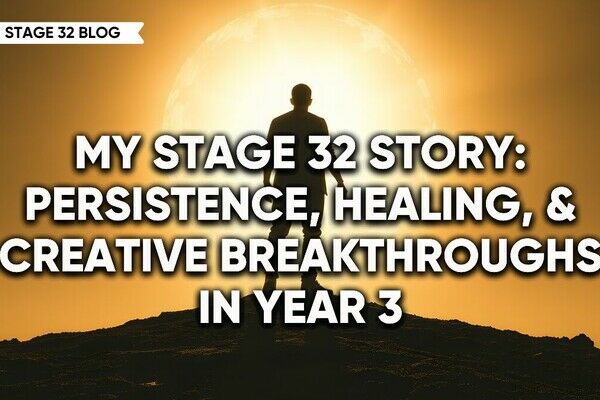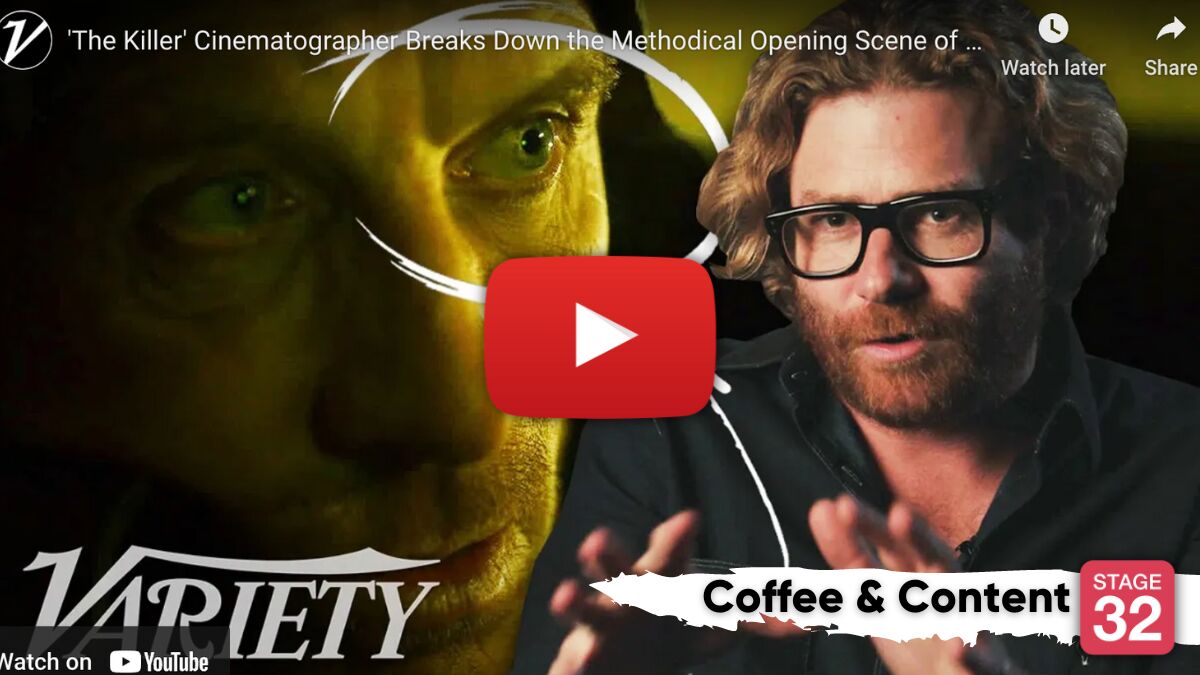The Road Most Traveled: Shifting Your Perspective On Success In Entertainment
WARNING: Objects in mirror are closer than they appear, or is it that they may not be as close as they appear? I suppose it all depends on how they appear and how blind we’ve become to a message that’s under our noses every day; I’ll come back to this.
The mission you have chosen to accept in this industry is one of delivering a perspective. Whether you are a writer, actor, director, producer, costumer, or gaffer. The projects you work on will all set out to deliver a perspective through the skill you bring and that perspective shifts with each new project. The funny* thing is we often forget how to shift our personal perspective as we journey to achieve our professional goals and we end up at a crossroads when someone or something derails us. *This could also be very sad depending on your perspective.

This is the road we find ourselves on more often than not. This is the road of frustration when we get notes, or a no to our pitches, or from jobs we apply for. It’s very easy to get lost on this road; many who you think of having achieved the pinnacle of success have been there with you and ended up there even after they are able to add Oscar to their resumes.
Here are a few off the top of my head:
THE LION KING
This film was a “B” project at Disney that no one in animation wanted to work on. Everyone wanted to work on Pocahontas. It was called KING OF THE JUNGLE at first, had different directors and producers, and really floundered to find its story – its perspective. Because of its floundering, the leadership was pulled off; friends of mine lost their jobs, while the new team went to Africa.
Out of that trip, they heard the words "HAKUNA MATATA", while at the same time, Elton John was “boring” them with The Circle of Life on a piano. Once Ladysmith Black Mambazo performed Elton’s words, the perspective changed. A few years, thousands of hours, and artists later it became the highest-grossing film of all time, POCAHONTAS not so much.
FROZEN
Was in the development department for 28 years. Walt originally wanted to make it but couldn’t find the story. Disney did something unusual and it put out an OWA (open writing assignment). Jennifer Lee had been brought on for a brush-up on WRECK IT RALPH and ended up landing the FROZEN job.
Prior to this, she was not in animation. She was a quarter-finalist in the 2009 Nicholl Fellowship. Even so, she struggled to find FROZEN’s perspective until the song lyrics came in for "Let it Go." (You can hate me for putting that earworm in your brain in your acceptance speech). Jennifer is now the creative executive in charge at Disney Animation. FROZEN has grossed billions and surpassed THE LION KING’s billions.

EMPEROR’S NEW GROOVE
Had several names and directors and storylines and today is a cult classic in animation lore. There is a rogue documentary called THE SWEATBOX that is worth a look if you can find it. Disney is so ashamed of the process they often have it removed from YouTube.
It chronicles Sting’s early days on the project and the incredible frustration that grew out of working for the studio. Sweatbox is a throwback term from Walt’s days; the animators and Walt used to review dailies in a tiny room that had no ventilation. The term is still used, only now it is project leadership gathering in an editorial suite; the directors give notes on the new footage in each day that the departments then implement.
BRAVE
This Oscar-winning Pixar film was conceived by Brenda Chapman (who incidentally was also the head of story on THE LION KING). At Pixar, they typically give the person who gets the story concept greenlit, the director’s chair, which would make Brenda the first woman director at Pixar (she already had the title of the first woman director of a studio animated feature with PRINCE OF EGYPT). About 75% into production, she was let go due to “creative differences.” A man took her place. I actually remember where I was when the news broke it was that monumental.
I was at a table with Barry Josephson at the Austin Film Festival. Barry was working with Brenda’s husband (also a director). I got the notification on my phone and told him. “That is not a happy household,” he said calmly and we both sat there let the news sink in. Fortunately, Pixar did not deny her in sharing the Oscar, but the point is, Brenda did not waste a minute in shifting the perspective of what happened to raise awareness for women in film. She shifted the narrative not to one of bitterness (which there was plenty) but to one of awareness, one that she continues to present to this day. She has had some other fairly noteworthy disappointments since but she now has her own production banner and is with Range Media partners.
JAWS
The horrendous production problems that almost sank the film were what ended up making it such a huge success. Or, as Spielberg once put it, “The film went from a Japanese Saturday matinee horror flick to more of a Hitchcock, the less-you-see-the-more-you-get thriller.” And, of course, it launched Spielberg’s Oscar-winning career.

CITIZEN KANE
Despite prevailing over the tremendous production and distribution hurdles, the film did not make Welles his money back and faded from public awareness until 15 years later when it was re-released after a French journalist wrote that it deserved another look.
CHARLIE CHAPLIN
Chaplin wrote, directed, produced, edited, starred in, and composed the music for most of his films and co-founded the distribution company United Artists, which gave him complete control over his films after he grew frustrated that the studios were to concerned with quantity over quality and though he was well-paid he refused to make the work formulaic.
ALFRED HITCHCOCK
Hitchcock had an incredibly difficult time getting studio support for PSYCHO. The film was initially considered controversial and received mixed reviews, but audience interest and outstanding box-office returns prompted a major critical re-evaluation, and is now considered one of his best films as well as a major work of cinema in general.
I tend to get a lot of biopics to work on. The ones I take on myself tend to be stories of people most would consider well-known, but the fact of the matter is that they carry a well-known perception that is wrong – so I try to right it.
The ones that I am often hired to write tend to be about a well-known aspect of life that has an interesting story behind it, one that audiences would be amazed at how close this breakthrough (or even life-saving device) almost ceased to advance to where its indispensable status in the world is today, so these are more about bringing an awareness.
Both kinds are about a shift in perspective.
One of the two that I am currently breaking story on is about a famous pool shark who is often thought of as the best there ever was and I was surprised to learn that he wasn’t. But this guy could talk the skin off a rhino and thus the perception of his legacy was cemented.

Every single person who is behind these creations or discoveries has one thing in common; the narrative of who they are or what the creation became, is largely driven by a perception that has embedded itself in the sphere of our awareness regardless of what it took to realize some measure of success.
When I left my cushy studio job, I gave six months' notice because I knew I would have to do a lot of training and preparation to leave my colleagues on solid ground, but I also made up my mind to control the trajectory of my exit so that I could start my independent journey my way and with less stress and emotion. I had made this decision at least 6 months before I gave that 6-month notice. My eyes were opened by the biography of Charles M. Schulz. He tells the story not only of his struggles but also of the moment it all turned around for him. It was the moment he decided to make Snoopy stand up.
I was so blown away by that simple shift in perspective that made all the difference in the world that I used the line in my resignation letter; it was time for me to make Snoopy stand up. The reason I left was so that I could control my creative content. (The studio had a boilerplate in every contract that no lawyer or negotiation could remove, and that is that they owned everything you conceived while in their employ).
I had forgotten that personal mantra in the past few years, and certainly during lockdown, where every single day felt like the one before as I pushed dozens of projects toward some sort of progress; breaking my back and soul to gain traction on the slippery slope of show business. And then it came back to me. As I broke out a new planner, I took out a big silver Sharpie and wrote on the cover, MAKE SNOOPY STAND UP.
Did it instantly get my projects funded, into production, or off of the shelves of some studio exec who has a hungry ego? Hell no. But of the 20 or so projects I have on my slate, that aren’t tied up with hungry egos, I have shifted the narrative of what they are and why they deserve to be seen and made, and that has made all the difference in the world. Both for my mental well-being and for the progress of the projects.
Controlling the narrative of our projects and our personal lives is not about arguing a point or trying to force someone to see something your way. We all know not everyone will. We all know that when your film or series does debut not everyone will like it the same amount, if at all. Controlling the narrative of any personal and professional endeavor, is about sitting with what you have, what you love, finding the seed that grew it, and dusting it off in a way that will give it new life, so that those who are looking for a similar feeling are more likely to notice.
One of my favorite clips in the world is in the movie WHO FRAMED ROGER RABBIT (which is the movie that prompted me to leave a career in advertising for film).
"Who Framed Roger Rabbit?" Clip, 1988
The entire film is about perception and how we can let life drag us down if we don’t shift our stance, and this clip is a meta variation of how the timing of that perception can be used to great effect.
We are all on this road together, we all face hardship and the agony of others not supporting our projects or vision or even the painful realization that sometimes the truth is, the project isn’t as good as you think it is. And that’s where and when we need to lean on our team (or network) to find a solution that will change the narrative. I bring you this perspective today after I spent an inspiring 2 + hours with the members of the Stage 32 Writers’ Room and Stage 32 CEO RB. I have found tremendous kinship and success through the broad network on Stage 32, and have shifted my perspective to the point where I am comfortable with it, in the Writers’ Room.
Whether it’s Hakuna Matata, Let it go, Smile, a bigger boat or Rosebud, or a beagle able to stand, all of these were a deliberate deciding moment that came about by shifting a view ever so slightly, and not giving up.
The road most traveled on everyone’s endeavor is laden with potholes and a horrible patchwork or bumps (will they ever get the infrastructure bill passed?), but after a week on the job, every seasoned commuter becomes aware and learns to shift enough to make the road a little less bumpy, sometimes that shift is a different route, sometimes it’s a different lane, sometimes it’s the speed or manner in which you approach it. Even though we are all on the same road, it is different for everyone, and that difference is largely in your control. It’s not so much the destination vs. journey debate; it’s about taking control of the journey so that when you reach the destination you are able to fully enjoy it. How will you adjust your journey?
FYI, our car mirrors' convexity gives them a useful field of view, it also makes objects appear smaller. Since smaller-appearing objects seem farther away than they actually are. So, just maybe your goal is closer than it appears simply because of your perspective.
Let's hear your thoughts in the comments below!
Got an idea for a post? Or have you collaborated with Stage 32 members to create a project? We'd love to hear about it. Email Emily at blog@stage32.com and let's get your post published!
Please help support your fellow Stage 32ers by sharing this on social. Check out the social media buttons at the top to share on Instagram @stage32 Twitter @stage32 Facebook @stage32 and LinkedIn @stage-32
| Cinematography Networking Tips |
| Coffee & Content: 'The Killer' Cinematographer Breaks Down Opening Of Fincher's Netflix Thriller |
Search Stage 32 Blog
There are now 4032 blog posts for you to enjoy. Search them all by tags below.
Acting, Advice, Cinematography, Coffee & Content, Composing, Contests, Distribution, Featured, Filmmaking, Financing, Inspirational, Networking, Producing, Screenwriting, Success Stories, Tips, Trending,Relevant Tags
Recommended Articles

How Modern Franchises Became Our New Religion

Coffee & Content: Why Your Pitch Needs to Be Human

Forbes Spotlights Stage 32 Certification!

Stage 32 Featured at the 43rd Torino Film Festival!

Insider Intel: The Studio War & The Rise of Indies

Stage 32 + Mark Creative Management Partner For Exclusive Opportunity for Writers to Land Representation!

My Stage 32 Story: Persistence, Healing, & Creative Breakthroughs in Year 3

4 Reasons To Have Audio Description On Your Film

Wearing Many Hats As A Creative






